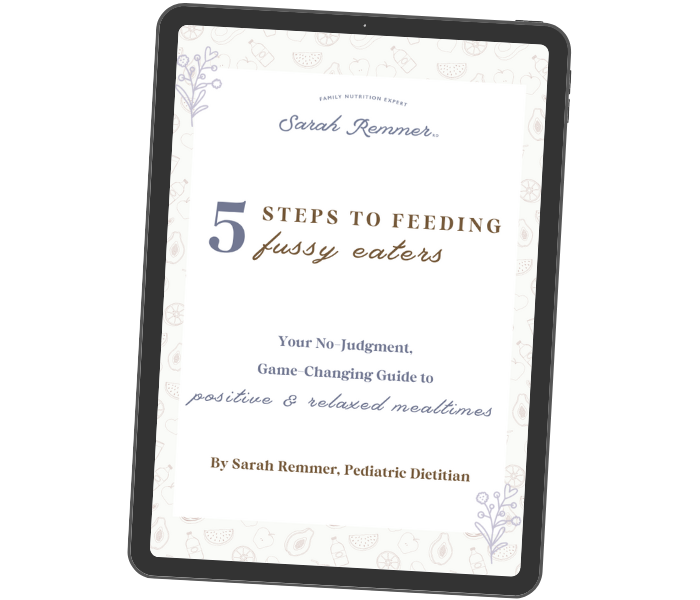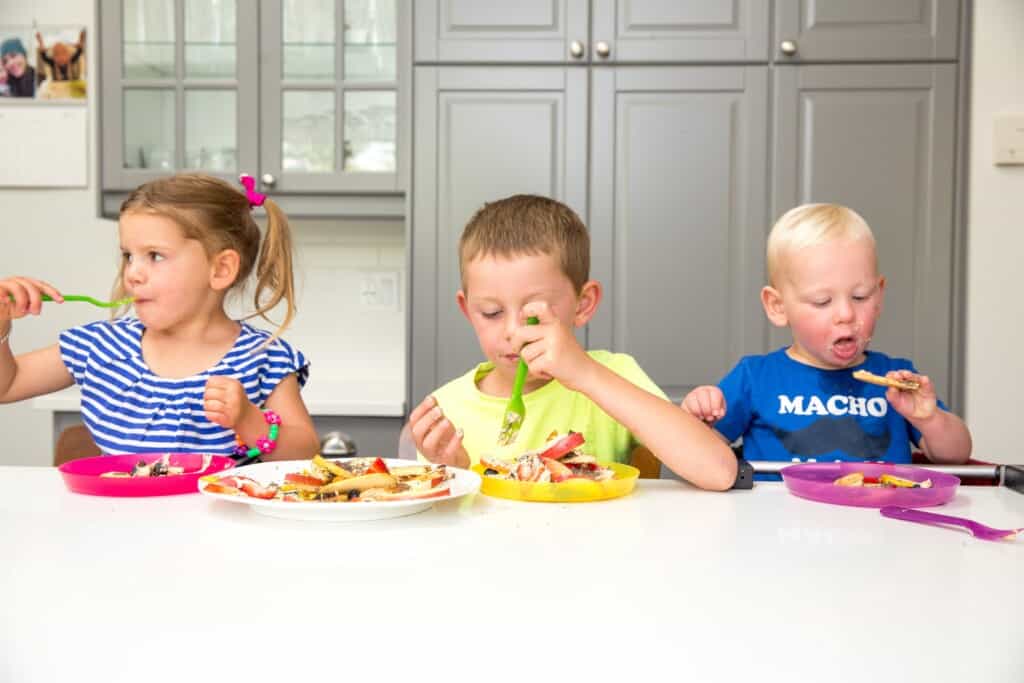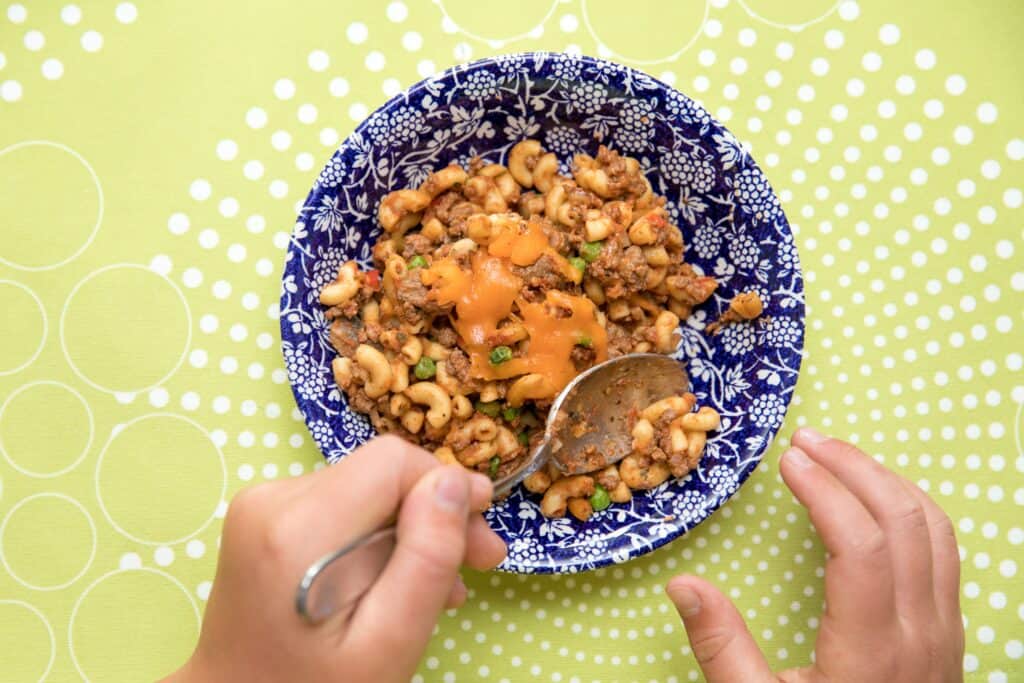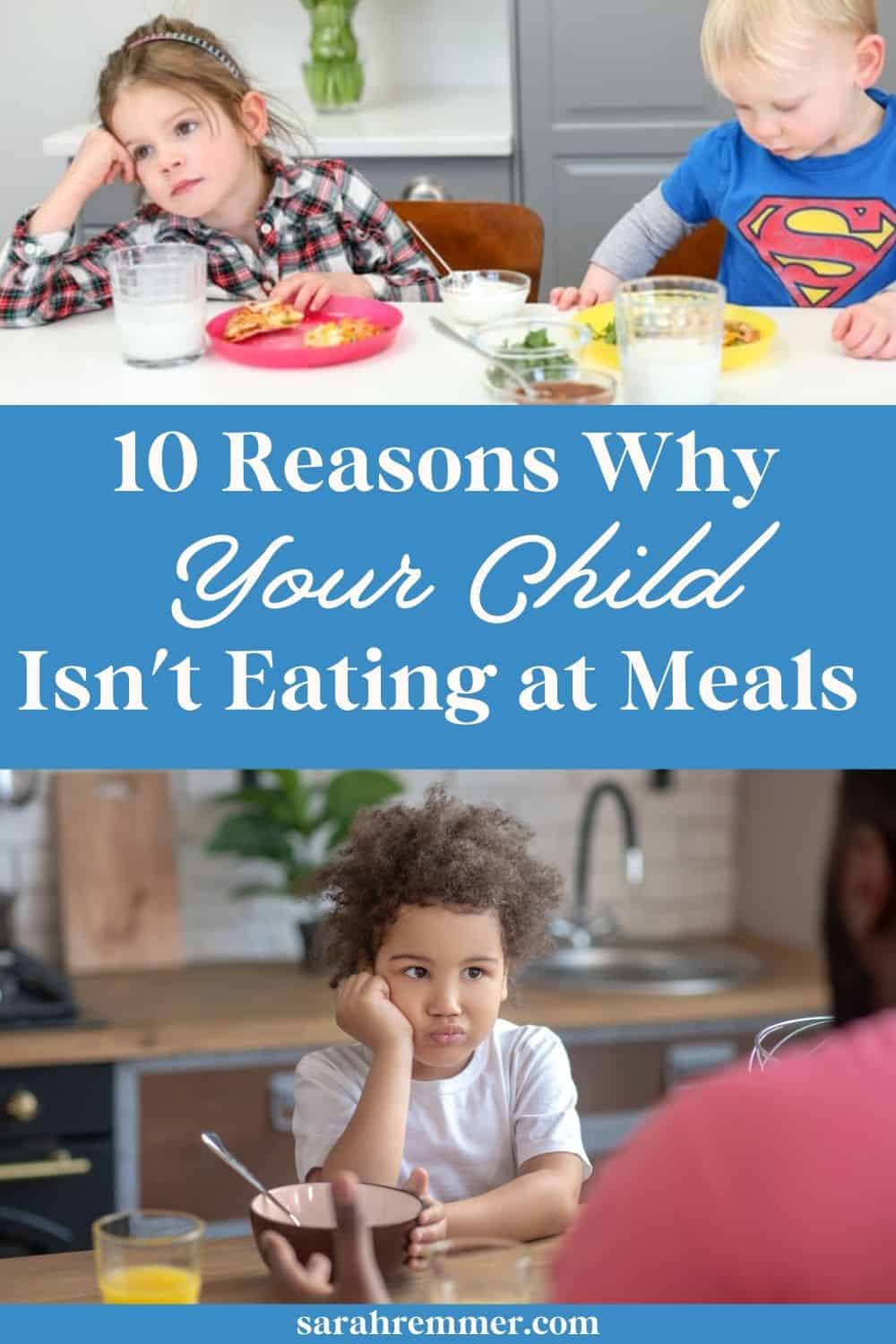The reasons why a child between the ages 2-5 refuses to eat might surprise you. The good news is, making a few simple adjustments can change everything!

If you’d like to learn more about this topic in a visual way, check out my Google web stories on 5+ reasons your child refuses to eat and what to do!
Need personalized nutrition support?
Book an appointment with one of our pediatric dietitians today!
As frustrating as it is, food refusal is 100% normal
There’s nothing quite as frustrating and defeating as spending time prepping, cooking, and serving a meal, only to have your child refuse to eat.
Having three kids myself, and knowing the importance of nutrition for growth and development (after all, I am a pediatric dietitian), I know just how hard this can be.
As much as we want to micromanage our child’s food intake though, doing so creates major power struggles, mealtime meltdowns and stress for everyone.
Here’s the thing:
Kids’ eating patterns are random, unpredictable and all over the map. That’s why it’s so important not to go into mealtimes with an agenda, and focus on what you CAN and SHOULD control. Before diving into the 10 common reasons a child refuses to eat, let’s go over division of responsibility in feeding.
Division of responsibility in feeding (sDOR)
I’m a big fan of the division of responsibility in feeding (sDOR).
This philosophy comes from Ellyn Satter, who is a childhood feeding expert and author. Her strategy has been heavily researched and has been proven over and over and over again to work wonders with families and children.
The sDOR distinguishes between a parent/caregiver’s responsibilities in feeding and the child’s responsibility:
Parents/caregivers are in charge of:
- What is served
- When it’s served
- Where it’s served
Kids are in charge of:
- Whether they eat
- How much they eat
As simple as it sounds, this philosophy will transform your mealtimes. I promise!
99% of picky eating issues stem from the sDOR not being followed. And with good intention, well-meaning parents go into meals with an agenda, and believe it’s their job to “get their child to eat”.
Repeat after me: “It’s NOT my job to get my kid to eat”.
Sarah Remmer, RD
When we start to feel frustrated and defeated in the face of picky eating, we can often resort to techniques such as:
- Bribing: “if you eat three more bites of broccoli you can have dessert”
- Shaming: “your brother always eats his vegetables, so why can’t you?!”
- Punishing: “no TV tonight for you because you didn’t eat all of your dinner”
- Forcing: “you cannot get down from the table until you have had two more bites”
- Distracting: “you can watch your favorite show while you eat your dinner”
These may act as short-term solutions, but they can negatively affect our kids’ eating and nutrition long term. Although these tactics are extremely tempting, especially when you’ve witnessed your little one finally eat a decent portion of their meal as a result, looking through your “short-term feeding lens” (“I just want him to eat his meal!”) actually sets your child up for failure later on.
Overtime, kids stop trusting their own physical hunger cues and become less intuitive, relying more on external cues to tell them what to eat, and picky eating habits become worse.

Feeling frustrated and hopeless with your picky eater?
I’ve got you! Get a copy of my 5 Steps to Feeding Fussy Eaters E-Book directly to your inbox.
How to set up kids up for eating success
The more pressure they feel, the less likely they’ll eat and enjoy mealtimes.
This is the opposite of what we want as parents.
We want to nurture our child’s natural ability to eat intuitively. We want our kids to trust their bodies and learn how to self-regulate. We want our kids to have a healthy long-term relationship with food.

Understanding why a child refuses to eat
To give you some context into why your child may be refusing to eat, I’ve listed the 10 most common reasons a child refuses to eat below (and some possible solutions).
Like I mentioned earlier, kids’ eating patterns are all over the place and there are so many factors that play into if and how much they eat.
As long as you:
- follow the sDOR
- focus on your responsibilities as the parent (what, when and where)
- keep mealtimes as positive and pleasant as possible, and
- focus on your own meal
you’re doing your job as the child’s parent/caregiver!

10 common reasons a child refuses to eat at meals
- They feel pressure
- They feel that they have no say
- They’re bored
- They’re simply not hungry
- They’re distracted
- Portions are too big
- They’re not feeling well
- Too much milk (or juice)
- There are too many snacks
- They’re too tired
1. They feel pressure
If a child feels pressure to eat or senses that you as the parent are anxious at mealtimes, they will likely back off and not eat.
Toddlers and young kids sense pressure, even if it’s not as direct as “eat your peas!” If you focus too much on what and how much they’re eating during a meal instead of allowing them to simply be another eater at the table (while you focus on your own meal), they’ll become anxious and likely resist eating.
Perhaps you:
- push food closer to them
- watch them every move
- hover over them
- continually take uneaten food off of their tray and replace it with new food
- talk about their lack of eating
- try to spoon-feed them
these are all forms of indirect pressure.
How to fix it:
Let your toddler self-feed and eat at their own pace at meals, provide lots of food variety at meals in manageable amounts, and let them be in charge of whether and how much they eat. Try your best not to hover over your child. I know–it’s hard not to when they hardly touch their food. Sit back and engage in conversations with the whole family, including your child.
If you can think about mealtime more as “family bonding time” than “get my kid to eat time”, your child won’t feel as pressured and will be more open to trying new or previously rejected foods.

2. They feel that they have no say
We know from research that kids eat better when they have a hand in helping with shopping, preparing, cooking or serving their meal.
That’s why it’s important to include kids in meal prep–even getting them to mix together ingredients or set the table can help. And even though parents should ultimately be in charge of the “what’s” of feeding, kids might feel as though they have no control or say over what they’re fed if you don’t include them in choosing foods once in a while.
They may grow bored of what you serve them, or perhaps they don’t like the way their food is plated.
How to fix it:
It’s important to set healthy boundaries and uphold your responsibility of “what, when and where”, but it’s also ok to let your kids be a part of the process.
Get them involved in shopping, prepping, menu planning, cooking, serving and cleaning up! I never thought I’d say this, but my kids love packing their lunches now using their Fenigo leak-proof lunchbox sets. They also love these zero waste lunchbox accessories, too.
Yes, involving your kids can make the process a bit longer and maybe a bit more frustrating, but the benefits are huge and it’s worth it.
Try serving meals family-style (sort of a like a deconstructed meal!). Place all of the ingredients on the table and let your kids build their own meal. This still allows you to be in charge of what is served, but gives your kids a sense of independence and control. This strategy works really well with meals like tacos, yogurt parfaits, pasta nights, stir-fries, homemade pizza, buddha bowls and oatmeal “sundaes”.
3. They’re bored
I’m like any parent and get stuck in “food ruts” where I serve the same thing over and over again. Translation: major kid boredom and eventual food refusal.
Here’s an example: after my third baby was born, I felt as though I was in survival mode for a few months (I still do sometimes!) and sent my son to school with the same snack pretty much every day: a healthy granola bar, cheese or yogurt and a piece of fruit. Yep, the same thing over and over again. He started coming home with most of his snack uneaten not just once, but pretty much every day.
In my sleep-deprived state, I didn’t realize that he could be growing tired of his snack, even though he used to love it.
How I fixed it:
I asked him why he wasn’t eating his snack and he said “I don’t know, I just don’t like it any more”. I then asked him if he was bored of it and he replied “yes I’m bored of it”.
We then came up with a few new and different snack option for him together and I try to rotate through three or four of them so that he doesn’t get bored. We get bored of certain foods and so do our kids. This is usually an easy challenge to overcome.
Switch up serving styles. Something as simple as changing the shape or texture of food can make a difference to a child. If raw cauliflower, carrots or celery are too crunchy, steam them. Mix cucumber “coins” with strips, or try sweet potato “fries” instead of roasted sweet potato, or butternut squash soup instead of baked butternut squash! Experiment to see what they like best.
4. They’re simply not hungry
We now know that toddlers’ and kids’ appetites can be unpredictable and erratic at the best of times. After the age of two, growth slows and stabilizes which means that toddlers aren’t as hungry as they used to be.
Kids have “hungry days” and “full days” and that could mean that one day, your child out-eats everyone at the table, and another day they doesn’t eat much at all at his dinner.
As long as you’re maintaining your feeding roles and staying consistent with mealtime boundaries, your child should be in charge of whether and how much they eat. It is possible that your child is simply not physically hungry when a meal is served (for whatever reason) and that’s ok.
How to fix it:
Try to accept “I’m just not hungry” as an acceptable answer, and remind your child that the kitchen will be closed after mealtime.

5. They’re distracted
Allowing your kids to watch TV, watch an iPad, or play with toys at the table is a recipe for distraction.
When a child is watching a show or playing a game on an iPad while eating, they are focusing most, if not ALL, of their attention on screen. There is no attention left for eating their meal, let alone listening to their tummy. With a screen in front of them, kids will can easily under or over-eat because they’re just not paying attention.
Young kids have a hard enough time focusing on their meal with minimal distractions let alone a big shiny moving screen in front of them. The same goes for toys and playing with siblings at the table.
How to fix it:
No toys at the table and no eating in front of the TV (that goes for parent too—no phones at the table!).
Many well-meaning parents depend on screens or toys to distract their child into eating two or three more bites, but this is counter-productive and can make the problem worse (and create a pesky, hard-to-break habit!). Screens and other distractions interfere with a child’s ability to self-regulate and tune in to their appetite.
6. Portions are too big
Some kids are turned off of a meal simply because the portion that they’ve been served is too large and overwhelming.
This was never a problem with my oldest son, but is definitely a problem with my daughter. I used to serve her the same amount that I served my son (this was a mindless habit that I got into), but then after many meal rejections, realized that I was serving her too much. We were wasting food and my daughter was overwhelmed with the portions that I was offering.
How I fixed it:
When I cut her portions down (by more than one half!), she started eating her meals again and sometimes even asked for more.
I served her less of everything, but still made sure that she was getting a nice balanced meal. I realized that I am like this too–if I’m served too large of a portion of any food, I immediately become turned off and don’t eat as much.

7. They’re nervous or scared to try it
Imagine trying a foreign food for the first time, without knowing how it tastes or feels in your mouth. You might be tentative too! Kids have more taste buds than we do too, so all foods have a more intense taste for them.
How to fix it:
Try the tester plate! Try introducing a tester plate to sit next to your child’s real plate or bowl. This is reserved for those foods that are unfamiliar, scary, or “yucky.” Kids don’t have to eat or even taste the foods on this plate, but they can touch them, smell them, mush them, stack them, lick them, or even taste and politely spit them out. It’s a safe and fun way to explore the food without actually eating it. And it brings kids 1 step closer to eventually accepting them later on! The other option is just making sure that foods are separate on their plate. Some kids don’t like foods touching one another so going with a divided plate can work well too. This is my favourite one.
Acknowledge their bravery. Parents often praise their kids for trying new foods or eating certain amounts. Although well intentioned, overpraising at meals sends the wrong message. We want our kids to eat intuitively and to learn to love a variety of foods in their own time.
Instead of praising, notice and acknowledge your child’s bravery when trying something new by saying something like, “That was so brave of you to try the broccoli tonight!” It will boost their confidence and increase the likelihood of your child being more adventurous with other foods too.
Try a “tester plate” for unfamiliar or previously rejected foods. It often works like a charm!
Sarah Remmer, RD
8. Too much milk (or juice)
Between-meal-milk-drinking can have a satiating effect. Milk contains fat as well as protein, two nutrients that make kids feel full. Too much milk can displace other important nutrients too, filling precious tummy space that should have room for a variety of different foods.
Too much milk and juice can also negatively affect dental health.
How to fix it:
Toddlers and children should be offered no more than 500mL (two cups) of milk per day. Try offering half a cup at each meal (or right after), which leaves room for another half cup before bedtime if that is part of your routine. Water should be the only fluid offered between meals for hydration.
Juice contains excess calories and sugar that children don’t need – it fills them up with little nutritional value. Did you know that a 250 mL (1 cup) juice box contains six teaspoons of sugar?
If your children drink juice, limit it to no more than 125 mL (1/2 cup) per day and water it down (and offer at meals with food).

9. There are too many snacks
Kids who “graze” between meals often, or snack randomly throughout the day may come to the table feeling too full to eat their meal.
This is why it is so important to establish structure around snack times.
How to fix it:
There should be a designated snack time where one or two foods of the parent’s choosing (such as yogurt and fruit or cheese and crackers) are offered, rather than snacking being a random free-for-all in between meals.
Toddlers and young kids need to be given the chance to build an appetite for meals, otherwise, they won’t eat much and it will be harder for them to learn self-regulation. This not only disrupts family mealtimes, but can also affect a child’s nutritional intake and overall relationship with food over time.
10. There’s a real medical reason affecting your child’s ability to eat
It is possible that there is a real, physical or medical concern affecting your child’s ability to eat. Here’s 4 legit reasons for picky eating:
Eating is uncomfortable
Eating may actually hurt your child, if there is an underlying medical concern. This could be caused by food allergies, reflux, eosinophilic esophagitis (painful erosions in the esophagus), or severe constipation. Other non-food related conditions that affect comfortable eating are breathing or muscle movement conditions (congenital heart defects, severe asthma, or muscular dystrophy).
Eating feels weird
Kids with sensory integration issues may be more sensitive to tastes, textures, smells and even the sight of food (they just feel more intense!). Sometimes, they simply can’t feel food in their mouth (this is where food pocketing may come in) or they only feel comfortable eating foods with a uniform texture (only crunchy or only smooth).
Eating is just too hard
When oral-motor control and function are compromised, such as with a cleft palate or with malformations of digestive or oral muscles (trachea or esophagus, tongue), eating can be really really tough and painful. Not to mention severe dental issues, enlarged adenoids and tonsils. Ouch! In some of these cases, it is worth seeking professional help from a qualified speech language pathologist, especially if your child can’t chew, or swallow solid foods comfortably by about 15 months.
Eating is scary
Kids who experience trauma while eating — even with no history of picky eating — may refuse to eat (especially the particular food culprit). Think choking, or maybe an experience where a child was forced to eat. Or maybe they got sick (vomited), felt extremely nauseous afterward, or inhaled (aspirated) a food. All of these experiences can make food “scary.”
How to fix it:
If you think this might be the case, it’s important to consult with your child’s doctor and request a referral to a qualified Speech Language Pathologist, Occupational Therapist and/or Paediatric Registered Dietitian who specialize in feeding issues.
Did you know that we offer personalized nutrition counselling for kids and families? If this is something you’d like to learn more about, please visit The Centre for Family Nutrition.





![[AD] It’s Day 6 of my 15-Minute Supper Series and today we’re putting a delicious twist on a classic BLT to make it nourishing and meal-worthy 🤤
Make sure to comment “Spud” and I’ll send you my top dietitian tips for feeding your family on busy weeknights along with a huge list of meal ideas!
This pasta salad takes no time at all to throw together and has everything you need for a nourishing meal. I always make extra bacon for things like this, but if you don’t have any cooked bacon I find cooking it in the airfryer or stovetop the quickest 🥓
I find that this salad lasts 2-3 days in the fridge without getting too soggy. You can also add in fresh lettuce to crisp it up or add the dressing when you eat it.
I ordered all of my groceries from @spuddelivers, which always saves me time and effort and gives me peace of mind knowing that I’m using high-quality, local and sustainable ingredients. I love that they come straight to my door the day after ordering 🙌🏻
Let’s make it!
Ingredients:
* 10 slices bacon cooked and diced
* 12 ounces pasta cooked and cooled
* 1 cup homemade Ranch dressing
* 1 ½ cup baby tomatoes diced
* ½ avocado diced
* feta
* ⅓ cup red onion diced
* 1 cup romaine lettuce
* fresh parsley for garnish optional
Homemade ranch dressing:
* ¾ cup mayonnaise
* ½ cup sour cream or Greek yogurt
* ½ teaspoon dried chives
* ½ teaspoon dried parsley
* ½ teaspoon dried dill weed
* ¼ teaspoon garlic powder
* ¼ teaspoon onion powder
* Salt and pepper to taste
Make it:
1. Blend all Ranch dressing ingredients together in a small blender (or whisk by hand) and set aside.
2. In a large bowl assemble the pasta, tomatoes, avocado, cheese, red onion, lettuce and bacon.
3. Pour the dressing over and toss to combine.
4. Garnish with parsley and serve.
You are going to LOVE this meal-worthy salad, I promise!
Comment SPUD to receive my top dietitian-approved tips for feeding your family during the week, a long list of ideas, and a curated shopping list with all of the ingredients for this recipe + all of the other ideas that I share in this resource!
#sponsored #spuddelivers #15minutemeals #whatsfordinner #easymealideas #dietitianapproved](https://www.sarahremmer.com/wp-content/uploads/sb-instagram-feed-images/438745920_798281295514125_2547899647147267180_nfull.jpg)



Comments
Lindsay Elenbaas says
This is extremely helpful and my husband and I have tried all of these tips and tricks but it’s to the point with my 4yr old where we are quite concerned it’s impacting it’s health and development. At what point do more extreme measures or interventions have to be made?
Sarah Remmer, RD says
Hi Lindsay, thank you so much for reaching out. Sending so much compassion your way! It is very difficult for me to comment on your situation properly so I’d highly suggest you book an appointment with my team: https://www.sarahremmer.com/book-an-appointment/
Edward Hall says
My kid is 4. How does this strategy work if a kid eats, but is only eating the parts of a meal that they want. I want to be able to serve my child (for example) vegetable lo mein, but they just pick out the noodles. I could serve the vegtables first, but I’d like my child to be able to eat a meal as it is served. What strategies work best with a kid who picks out the things they feel they don’t like when those are the things you actually need them to eat.
Sarah Remmer, RD says
Hi Edward! Thanks for being here and taking the time to write this question. There are a lot of things to unpack with this one. I’d highly recommend you reach out to my team here for more individualized support with your question (It’s a great one and we’d love to help you!): https://www.sarahremmer.com/contact/
niveditha ranjith k says
My daughter is 4 year and 10 months old. She use to vomit food during 6 months after we tried of providing solid food. due to fear she feels difficult to have food and thus she limited taking food. We tried many medications to deal with this issue and even asked doctors if she might have any stomach related issues. But none of the doctors care about her eating habits and say that she might have her food when she grow up. But this situation is increasing pressure and stress in my already pressured life style. Could you please suggest me some solution or any doctors who can deal with my child’s health issues. She is suffering from fever in every week and its affecting her overall lifestyle and I feel this might lead to something danger and which has to be solved at the earliest. Hope I get a solution for this situation.
Sarah Remmer says
Hi there, I am so sorry you are going through this incredibly distressing and difficult time. I would encourage you to please reach out to my team so we can point you in the right direction. Contact us here: https://www.sarahremmer.com/book-an-appointment/
Miranda Garza says
My 2yr old requires constant entertainment to eat books, toy, etc. if nothing she sticks her thumb in her mouth and won’t take it out so we are developing bad habits I know, but I worry about her not eating.
Sarah Remmer says
Hi Miranda, I’m sending you so much compassion right now. I know how frustrating this can be. I would highly recommend you reach out to our team for more specialized help: https://www.sarahremmer.com/book-an-appointment/
Wendy says
Thank you for this article.
My son is 4 and like most kids, has been in a phase of not eating well. I have 2 other children and they went through a similar phase, but by 4 had overcome it. However, my son is just getting worse. He’s basically down to eating “peanut butter tacos” (peanut butter on a small flour tortilla), peanut butter on a spoon, and spaghetti with sauce, but no meat (he used to eat that just fine, then stopped eating the meat sauce for some reason).
We’ve tried so many different things to help him eat balanced and healthy meals. We’ve tried rewards, bribing, punishment, and I’m ashamed to admit, but even yelling on bad days. We’ve also offered what’s for dinner and allowed him to not eat if he didn’t want to, but that meant he went to bed hungry. Recently, we tried to get him to eat his dinner and when he refused, we only offered that for breakfast, lunch, and dinner. He ate nothing for 2-1/2 days until I gave in because I couldn’t let him starve. I honestly don’t know what is the right thing to do and I feel like I’m reinforcing the behavior by giving in, but he’s 4!
I’ve noticed that he complains his teeth hurt when I try to brush them, but we had his teeth checked and there’s no cavities. Additionally, he used to eat peanut butter on toast (yes, there’s a theme), but the other day, he refused to eat the toast and licked the pb off.
I’ve also noticed some mild ASD symptoms, like repetitive phrases, lining things up in a row, and a few others, but at 4, it’s hard to know if it’s just a toddler thing, or a sensory thing, or more.
We are at our wits end. Based on what I’ve shared, do you think we need to have him checked medically or seek further psychological help?
Sarah Remmer says
Hi Wendy, thank you SO much for having the courage to reach out. This is a lot to manage on your own and yes, I definitely think you need more individualized support from our team. Please reach out to us here and we would be happy to set something up: https://www.sarahremmer.com/book-an-appointment/
Anna says
Thank you for this, how do you handle desert? My son has gotten into the habit of asking for a cookie before he eats any dinner and we are guilty of the bribing. I want to stop this, but want to know how we should be handling desert items for after dinner?
Sarah Remmer says
Hi Anna, this is a great question that comes up a lot. I have a post on that right here: https://www.sarahremmer.com/5-steps-to-raising-kids-who-eat-treats-mindfully-and-in-moderation/
I’d also encourage you to check out my free resources! https://www.sarahremmer.com/free-resources/
If you need further support, please feel free to reach out to our team here: https://www.sarahremmer.com/book-an-appointment/
Thanks so much for stopping by!
Jennifer says
Thanks for this article! My 5 yr old has been a picky eater since birth, I’ve long suspected it is sensory. He refuses any moist foods, saucy foods, “slimy” foods and foods that are mixed up or smooshed together. Somehow none of this applies to desserts though! Anyway, so it makes it really difficult for me in terms of feeding him. My husband and his family come from the authoritarian approach of “eat what’s on your plate or starve” camp – there’s a lot of standoffs and yelling at mealtimes, plus bribery on my part. My husband is stubborn as a mule and refuses any approach like the one you’ve outlined here, and refuses to compromise with me, saying I am coddling him. The whole eating situation is just stressing me out daily :(. I’ve run out of ideas on what to feed him, and I feel like its my fault I’m not able to make something nutritious that he loves to eat.
I have one question about your approach that I do agree with my husband on though – if we did this, then we’d be throwing out a LOT of food. How do you set your boundaries of what/where/when but ALSO teach kids to respect and appreciate food and not waste it? I think it is the latter that really sets my husband off and admittedly I was also raised to respect and not waste food.
Sarah Remmer says
Hi Jennifer, thanks for reaching out. This is really tough and I’m sending you so much compassion. To help reduce food waste, you could try plating up smaller portions to start and if your child requests more, add more. You could also try the “not yet foods plate” idea here: https://www.instagram.com/p/Cc3ol6pPVdw/ Here’s another post that might be helpful: https://www.instagram.com/p/CZKrjQ3vv8T/
For next steps, here are a few options. If you don’t already follow me on IG, please feel free because I answer a lot of questions like these! You’re also welcome to join my signature course called Mealtimes Solved: https://www.sarahremmer.com/shop/. Lastly, please feel free to contact me and my team here with any further questions! We have a dietitian who specializes in sensory feeding issues, if you live in Canada. But feel free to email us with any questions: https://www.sarahremmer.com/contact/
I hope this helps!
Aneliese Tidy says
Such a great article! Can I ask how I should approach my 4 year old son barely eating any dinner or lunch because he wants his pudding? But then as soon as pudding is done, he says he wants to eat something….but never wanting actual dinner??
We have tried serving dinner and pudding together and he chooses what to eat first, but he still won’t eat dinner and constantly asks for something else instead!
Sarah Remmer says
Hi Aneliese, I hear you in this struggle! You are not alone. There could be many factors at play here, including what boundaries are in place around mealtime and if there might be a sense of restriction around treat foods. Without knowing all the details, it’s hard for me to offer personalized advice. I don’t mean to sound “salesy” but have you checked out my book? It covers a variety of issues like this. https://www.sarahremmer.com/food-to-grow-on/ There’s also Mealtimes Solved, which is my course available here that goes into depth: https://www.sarahremmer.com/shop/ And finally, please feel free to email us with any questions you have! https://www.sarahremmer.com/book-an-appointment/
Thanks again for reaching out and reading my post!
Joey Bledsoe says
Hi Sarah, I am reaching out to you, about my friends who are fostering little 4 years old boy. This beautiful boy stresses over foods and they consistently pressure him to eat veggies and his plate of food. They do provide a time and where, what he will eat. So when it is time to eat the child is so stress he won’t eat. And if he does it is inconsistent on what he eats. Throws a huge tantrum, screams kicks and speak horrible things. They will give him the same meal on the next sitting, and if he doesn’t eat it , they make him eat it again. I feel this isn’t right to do. There will be a whole day the child won’t. And each time, it is such stressful time for everyone. But I can’t get them to understand. let Him eat everything else, that way he get nutrition. I hated veggies as a kid. The child loves fruit. I mentioned to them let him eat some fruits. they don’t feel he should because didnt eat the meal they made him. I would love help to save this little guy, who is so stressed out over food. They constantly reminding him on what he wont eat, they have taken his toys away, they dont take him outside, he doesnt get to be a child Basically. I am frustrated towards my freind
Sarah Remmer says
Hi Joey, thank you so much for taking the time to write here. Feeding children is no easy feat and can be so distressing. It sounds like there is a lot to unpack here, beyond what I can write in a comment. I would highly suggest you email us directly here: https://www.sarahremmer.com/book-an-appointment/ We also have a course called Mealtimes Solved which covers much of what you’re describing. I’d recommend passing this along to your friend, if it feels right: https://www.sarahremmer.com/shop/ Thanks again for reaching out.
Dil says
I have a daughter who recently turned 1 and she hasn’t been eating much ever since we started weaning with solids. Her patterns of eating is like she eats well for few days and does not eat much for few weeks which is really frustrating.
Sarah Remmer says
Thanks for sharing, Dil. You are not alone in this struggle. If you need further support, please reach out to me and my team: https://www.sarahremmer.com/book-an-appointment/